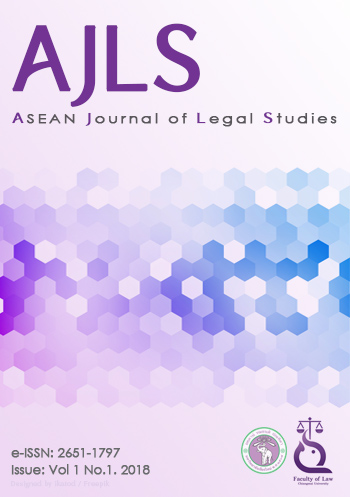Enhancing Mutual Recognition Agreements in Trade in Services Under AEC: Progressions and Constraints
Main Article Content
Abstract
The movement of people across national frontiers to render a service has been a highly regulated in ASEAN. Removing restrictions to labour flows within the region is admitted by ASEAN leaders as an essential component in formation of the ASEAN Economic Community (AEC). The AEC Blueprint 2025 has specifically stated the significance of the regime of mutual recognition on qualifications for professionals in ASEAN as it would facilitate implementation of the ASEN Framework Agreement on Services (AFAS) and Agreement on Movement of Natural Persons (MNP). Without the qualification harmonisation the ASEAN efforts to liberalise the service can be easily mitigated or nullified.
This paper will review the existing commitments and policies of ASEAN countries under the MRA, and to identify measures that could be considered by individual countries and by the ASEAN to expand the trade in services specific to the supply mode of movement of natural persons.
Article Details
Copyright in the manuscript and published article is held by the author(s). Authors are responsible for obtaining permission from copyright holders for reproducing any third party material in their articles (including illustrations, tables, or figures).
References
AEC Blueprint, para 19 sec 5.
AEC Blueprint, para 21 sec 5.
AFAS Agreement, art I (‘Purpose’).
AFAS Agreement, art III (‘Liberation’).
AFAS Agreement, art IV (‘Negotiating Specific Commitment’).
ASEAN Charter, art 2 (e).
ASEAN Agreement on Mutual Recognition for Architectural signed in Singapore on 19
November 2007.
ASEAN Agreement on Mutual Recognition for Dental Services signed Cha-am, Thailand on 26 February 2009.
ASEAN Agreement on Mutual Recognition For Medical Services signed Cha-am, Thailand on 26 February 2009.
ASEAN Framework Agreement on Mutual Recognition of Testing Services signed in Singapore on 19 November 2007.
ASEAN Framework Agreement on Mutual Recognition for Accounting Services signed in Cha-am, Thailand on 26 February 2009.
ASEAN Mutual Recognition Arrangement for Nursing Services signed in Cebu, Philippines on 8 December 2006.
ASEAN Mutual Recognition Arrangement for Technical Services, signed in Kuala Lumpur, Malaysia, 9 December 2005.
ASEAN Mutual Recognition Arrangement for Tourism signed in Bangkok, Thailand on 9 November 2012.
ASEAN Secretariat, ‘ASEAN Integration in Services’ [2015] 27–34.
B. Harkins and D. Lindgren, ‘Labour Migration in the ASEAN Region: Assessing the Social and Economic Outcomes for Migrant Workers’,
C. Shah and M. Long, ‘Labour Mobility and Mutual Recognition of Skills and Qualifications: European Union and Australia/New Zealand’ [2007] Monash University Centre for Economics of Educations and Training Working Paper 65; K. Nicolaidis, ‘East Asian Regionalism and EU Studies’ [2010] J EUR INTEGR 32(6), 597-616; C. Sa and P. Gaviria, ‘Asymmetrical Regionalism in North America: The Higher Education Sector since NAFTA’ [2012] Norteamerica 7(2), 111-140.
J. Trachman, ‘Emdedding Mutual Recognitaion at the WTO’ [2007] J EUR PUBLIC POLICY 14(5), 780-799.
K. Nikoladis, ‘Mutual Recognition of Regulatory Regimes: Some Lessons and Prospects’ [1997] Jean Monnet Working Papers 7/97. See also K. Nicolaidis and S. Schmidt, ‘Mutual Recognition “On Trial”: The Long Road to Services Liberalisation’ [2007]
J EUR PUBLIC POLICY 14(5) 717-734.
K.Nicolaidis and S.Schmidt, supranote 7, 717-734.
Pruksacholavit P., “Advancing the Right of Freedom of Movement in the AEC Framework; What the AEC Can Learn from the EU” [2014], INDON. J. INT'L & COMP. L. 1(2), 474-501.
S. Hamanaka and S. Jusoh, supranote 2, 3.
S. Hamanaka and S. Jusoh, supranote 2, 5.
S. Hamanaka and J. Sufian, ‘The Emerging ASEAN Approach to Mutual Recognition: A Comparison with Europe, Trans-Tasmania, and North America’ [2016], IDE Discussion Papers, 2.
T.S. Tullao, Jr. and M.A. Cortez, ‘Enhancing the Movement of Natural Persons in the ASEAN Region: Opportunities and Constraint’ [2006] ARTNeT Working Paper Series 23, 2.
VCCI, supranote 30.
Vuong Anh Dung, ‘Thoả thuận về dịch vụ kiến trúc giữa các nước Asean, bước chuẩn bị cho hành nghề của KTS trong AEC’ [Agreement on architectural services among ASEAN countries, the preparatory stage for the practice of architects in AEC] J. Architecture Magazine (Hanoi, 1 November 2015), 23.
Y. Fukunaga, ‘Assessing the Progress of ASEAN MRAs on Professional Services’ [2015] Economic Research Institute for ASEAN and East Asia 3; see also VCCI, “Cẩm nang về Cộng Đồng Kinh Tế ASEAN” [Handbook on the ASEAN Economic Community], https://chongbanphagia.vn/Modules/News/Uploaded/38/2017021510455756sach-aec.pdf>, last visited 12/1/2018.


